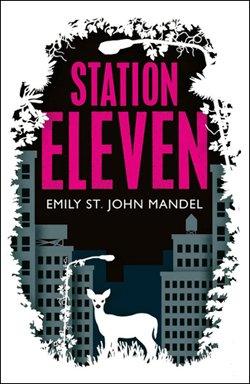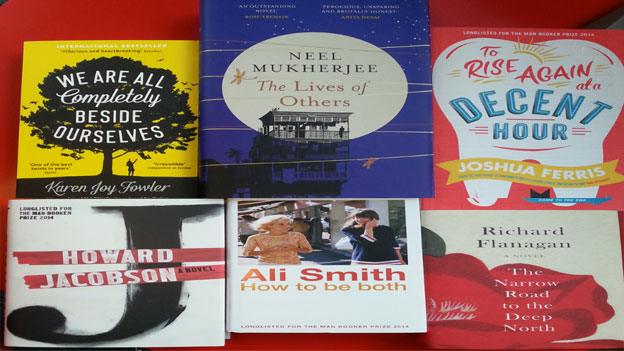Emily Mandel on why Shakespeare could survive the apocalypse
- Published

Station Eleven is Emily St John Mandel's fourth novel
Dystopian literary fiction is showing no signs of dying out.
Howard Jacobson's J, set in a future world where a past catastrophe is referred to as What Happened, If It Happened, is on this year's Man Booker shortlist - the winner of which will be announced on Tuesday.
One of the most high profile examples of dystopian literary fiction in recent years is Cormac McCarthy's 2006 novel The Road, which charts a father and son's journey across a ravaged landscape.
The young adult book market has seen the success of franchises such as The Hunger Games and Divergent.
The latest book on the subject, Emily St John Mandel's novel Station Eleven - in which a flu pandemic wipes out 99% of the world's population - approaches the topic from a cultural standpoint.
It features a troupe of Shakespearean actors - the Travelling Symphony - roaming a post-apocalyptic world with a Star Trek quote daubed on one of its caravans: "Because survival is insufficient".
The Canadian author tells the BBC why she thinks art will have such a crucial role after the collapse of civilisation.
How worried were you that the market for post-apocalyptic fiction might be saturated?
When I began writing the book it was late 2011 and there were a few post-apocalyptic literary novels but not many. By the time I'd finished the book the market seemed glutted with things. I was quite nervous that no one would want to buy it for that reason.

Station Eleven imagines a world in which a flu pandemic wipes out 99% of the population
Why has that genre engaged readers?
People have suggested to me that post-apocalyptic fiction and the large number of these books is related to a generalised nervousness that we feel about the state of the world - climate change, etc.
On the other hand - when has the world ever not seemed on the edge of catastrophe? You think back to the First and Second World Wars and various points politically in the 60s.
Another possibility is that it comes back to The Road. That was the book that gave literary novelists the permission to write in an area that had previously been the domain of pulp novels.
Did you think of Station Eleven as a literary or post-apocalyptic novel?
I thought of it as a literary novel. My first three books were categorised as literary noir - I've never meant to write a genre novel - I've always set out to write literary fiction with the strongest possible plot.
An unexpected side effect of this is it seems to push me over to the borderlands of genre. It makes one realise the extent to which genre is a marketing decision.
Do people make assumptions because it might be a genre novel?
I know some people won't read it because they are so burnt-out on post-apocalyptic fiction.
About half of it is set in the present day, so I don't think of it as a purely post-apocalyptic novel, and it's not a horror novel - I was going well out of my way to avoid that.

The novel begins with a Shakespearean actor dying on stage during a performance of King Lear
Why Shakespeare?
As I began thinking about this novel, my husband said people would want what was best about the world. In my completely subjective judgement that would include Shakespeare. As I began to research more about Shakespeare's life, I began to see some interesting parallels between his life and time and the post-pandemic world I was writing about.
The most obvious was that theatre in his time would often have been a matter of small travelling troupes moving from town to town. And the bubonic plague swept over Elizabethan England again and again.
It seems to me that the people of this time would have been haunted by memories of recent epidemics and that to me was a fascinating parallel to the time I was writing about after my fictional pandemic.
How did you find the experience of researching the book?
A lot of it is pure imagination. I found a faux Documentary called After Armageddon and it outlined what might happen after a flu pandemic. It was immensely useful in terms of thinking through what happens when people stop going to work: nobody is coming into the power plants which means that the grid starts to go down. If the ISP employees don't come into work, the internet doesn't last very long.
I was also thinking back to the 2003 blackout of New York city - it was only about 36 hours before the lights came back on - but in that moment everybody called each other at once because we assumed it was a terrorist attack and the cellular networks were instantly overwhelmed and nobody could call each other. That's why the cell phones go down so quickly in the book.
And you also visited some survivalist forums on the internet?
I was trying to get a better sense of the practicalities of living off the grid and I started googling these survivalist forums.
There's a community of people who are very actively preparing for the end of the world. They've purchased their 40 acres of land, they can fish and hunt. A typical post will be "my wife and I are taking the four kids and living off the grid - we have the AK-47s. Does anybody have any ideas for home schooling materials?"
It was incredibly disturbing, but fascinating.
Station Eleven (Picador) is out now
- Published9 September 2014
